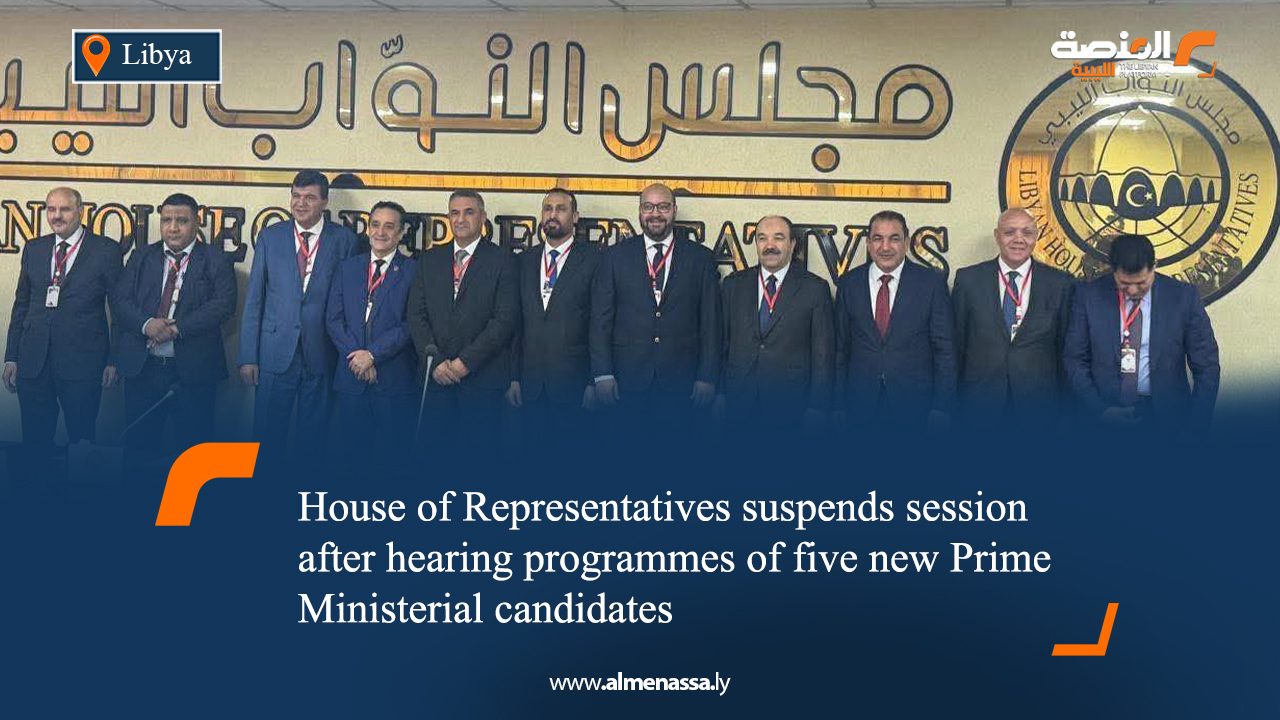The House of Representatives today, Wednesday, suspended its consultative session until a later date, following the completion of listening to the programmes of five additional candidates for the new prime ministership. This new government is expected to replace the Government of National Unity in Tripoli, which faces escalating popular demands for its departure.
The session included a detailed presentation of the candidates’ dossiers, followed by a review of their proposed governmental plans and visions. This step serves as a prelude to establishing the final criteria upon which the most suitable figure to lead the next government will be selected.
The candidates who presented their programmes in today’s session are: Salama Al-Ghwail, Abdul Basit Muhammad, Essam Abu Zriba, Othman Abdul Jalil, and Nasr Mohammed.
Salama Al-Ghwail: House of Representatives as Libya’s Saviour and National Project Custodian
In his commendation of the House of Representatives’ role, candidate Salama Al-Ghwail described the House as “wise leadership” and an “impenetrable dam,” asserting that its members stood firm against pressures and did not compromise on the national project. Al-Ghwail considered the House’s achievements to surpass those of any other party, stressing that the House of Representatives, Counsellor Aqila Saleh, played a pivotal role in protecting the country from collapse.
Regarding his previous experience, Al-Ghwail clarified that he resigned from the Government of National Unity because it “did not believe in national aspirations or state-building.” He pointed out that Libya possesses resources far exceeding many countries but needs “a rational man who shies away from ruin and destruction,” affirming that the state is being violated and requires a leader who “mends citizens’ hearts” instead of pursuing narrow interests.
Abdul Basit Muhammad: pledging a fair election and national institutional unification
Candidate Abdul Basit Muhammad affirmed that Libya is undergoing a critical phase demanding concerted efforts and diligent work to prepare the country for fair presidential and parliamentary elections. He clarified that his government’s policies would focus on supporting the High National Elections Commission, promoting official media without interference or bias, and dealing with all political entities in a spirit of cooperation, striving towards unifying the country and its institutions.
Abdul Basit stressed that elections are the optimal solution to exit the current crisis, pledging that his government would be an “election government” in every sense of the word, based on competence and fair geographical distribution, supportive of municipalities, the Joint Military Committee (5+5), and the Libyan Army as the safety valve. He also affirmed his commitment to supporting public freedoms, reforming the citizenship file, and expanding reconstruction efforts across the country, while pledging a transparent handover of power and accountability for any official proven to have engaged in corruption.
Essam Abu Zriba: Striving for stability, development, and preparing the Country for the electoral entitlement
Candidate Essam Abu Zriba announced that his primary goal is to steer the country towards security, stability and economic recovery, and to create a suitable environment for the upcoming electoral entitlement. He clarified that his government’s vision is based on principles of efficiency and achievement, taking into account Libya’s current circumstances. He affirmed commitment to the Constitutional Declaration and presented a clear roadmap extending between 12 to 24 months for managing state affairs.
Abu Zriba stressed that his government would focus on activating administrative decentralisation and developing infrastructure to establish smart cities, while ensuring fair geographical distribution of state resources and considering Libyan components. He also affirmed his commitment to protecting human rights, improving citizens’ living standards, supporting the High National Elections Commission, in addition to enhancing the role of women and youth, preserving national sovereignty, and halting all forms of foreign intervention.
Othman Abdul Jalil: A government of competencies to restore security and end transitional phases through fair elections
Candidate Othman Abdul Jalil announced that his government would prioritise financially and logistically supporting the High National Elections Commission, while ensuring the integrity of the electoral process through the use of biometric fingerprint systems and implementing a unified security plan overseen by the Ministry of Interior. He stressed that elections represent the voice of the people and the legitimacy of the state, affirming his commitment to holding presidential and parliamentary elections on their scheduled dates.
Abdul Jalil affirmed that his government would work to dissolve all irregular armed formations in various cities, rebuild the police and security agencies on modern foundations, combat corruption, and activate local governance to achieve social justice. He also pledged to reform the education and health sectors, revitalise the economy, and develop an integrated strategy to resolve the issue of tumours, noting that his government would be a government of competencies that restores citizens’ trust in the state, and proposes a law to criminalise any irregular armed entity and dry up its funding sources.
Nasr Mohammed: A unified government to address chaos, achieve stability, and build a state of institutions
Candidate Nasr Mohammed affirmed that his government’s priority would be to support the Joint Military Committee (5+5) process to maintain the ceasefire agreement, alongside working to close the dual employment file and establish clear mechanisms to curb fuel smuggling abroad. He stressed the necessity of diversifying energy sources to achieve economic stability and reduce reliance on oil, in addition to launching comprehensive awareness programmes targeting all segments of society.
Mohammed pointed out that Libya has suffered from chaos and a failure in public affairs management since 2011, with continued violations of sovereignty, the spread of mercenaries, and the plundering of wealth, amidst an ineffective role of oversight. He considered that the formation of a unified government with single sovereign authorities has become an urgent necessity, affirming his commitment to supporting civil society, achieving health insurance for every citizen with a national ID number, and allocating a portion of health centres to provide free services in partnership with international hospitals.
It is worth noting that yesterday’s Tuesday session also heard the programmes of seven other candidates: Abdul Karim Muqaiq, Fadil Al-Amin, Abdul Hakim Baayou, Othman Al-Basir, Muhammad Al-Muzoughi, Muhammad Al-Muntaser, and Ali Sassi.


